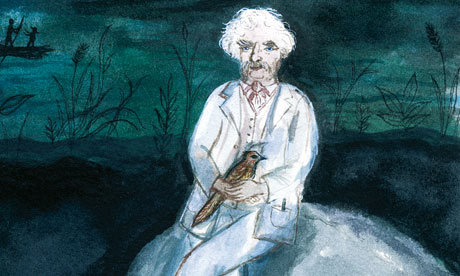
This year marks a century since the deaths of perhaps the two greatest psychologists America has ever produced. The one getting the attention in university psychology departments is William James, and fair enough: he did essentially invent the modern discipline. The other is Mark Twain. And if it's technically a little late to mark his centenary, I refer you to the following apology from Twain himself, real name Samuel Clemens: "I am a long time answering your letter, my dear Miss Harriet, but then you must remember that it is an equally long time since I received it – so that makes us even, & nobody to blame on either side."
There's a scurrilous rumour abroad, on self-improvement websites, that Twain is the source of the simpering fridge-magnet quotation "Dance like nobody's watching/Love like you've never been hurt/Sing like nobody's listening/Live like it's heaven on earth". What's interesting is not that this attribution is wrong, but that it's so precisely wrong: that quote embodies the opposite of Twain's acerbic, self-deprecating, winkingly ironic wit. Even the genuine Twainisms recycled in countless self-help books – "Age is an issue of mind over matter. If you don't mind, it doesn't matter" – aren't his best. I think I know why. Popular psychology, these days, is a strikingly earnest field; acerbic wit is largely the preserve of cynics who scoff at self-help. It's bizarre: all these grinning gurus preaching happiness, yet without much sense of humour. Twain proved that needn't be so: you can dispense real, uncynical life-wisdom, and still be hilarious.
Twain had little time for platitudes. Take "The early bird catches the worm": "Don't be fooled... I once knew a man who tried it. He got up at sunrise & a horse bit him." (He preferred getting up with the lark: "If you get the right kind of a lark... you can easily train him to get up at half past nine.") Instead, he offered plenty of advice that research would later support, or that pop psychologists would borrow: "You will be more disappointed by the things that you didn't do than by the ones you did"; "Habit is habit and not to be flung out of the window by any man, but coaxed downstairs a step at a time"; "Courage... is mastery of fear – not absence of fear" (aka Feel The Fear And Do It Anyway). His satirical "advice to youth", quoted in the recent collection Mark Twain's Helpful Hints For Good Living, is perfectly wise: "Always obey your parents, when they are present... Most parents think they know better than you do, and you can generally make more by humouring that superstition." He leant towards pacifism, but mocked the holier-than-thou: "I thoroughly disapprove of duels. If a man should challenge me, I would take him kindly and forgivingly by the hand and lead him to a quiet place and kill him."
Twain's wisdom was hard-won – he watched two of his three daughters die – and he was far more than a maxim machine: a novelist, a champion of women's rights and the abolition of slavery. But laughter, he knew, wasn't some optional extra. "Humour is the great thing," he wrote. "The saving thing." He died the day after Halley's Comet came closest to earth in 1910, having predicted as much: "I came in with Halley's Comet in 1835. It is coming again next year, and I expect to go out with it... The Almighty has said, no doubt: 'Now here are these two unaccountable freaks; they came in together, they must go out together.'"
oliver.burkeman@theguardian.com

